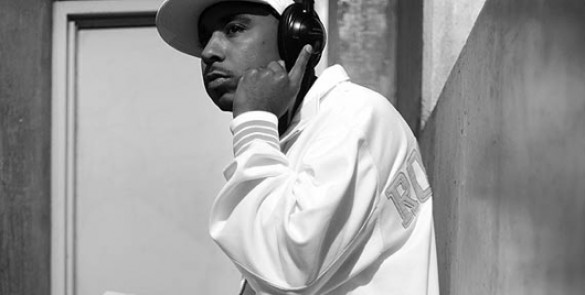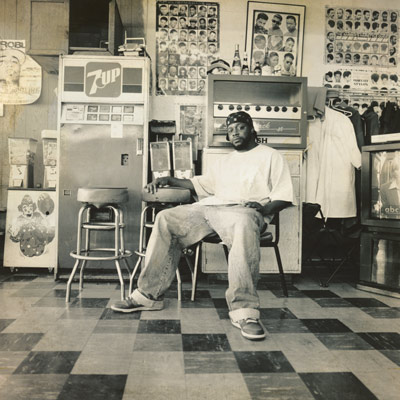Medaphoar aka M.E.D. (Stonesthrow)
The west coast MC called Medaphoar is known lately by the first three letters of his name: M to the E to the D. Three short letters for a long-awaited, full-length album which arrived at long last in 2005.
Why the hold up? Heads have been checking for more heat from young MED for a good while – since his recent appearance on Madvillain’s “Raid” (Madvillainy, 2004) going back to his debut on the now-classic Soundpieces by Lootpack back in ‘99. He showed up on Quasimoto’s Unseen (2000), and even made the sole MC appearance on Madlib’s acclaimed Shades of Blue. As an artist on Stones Throw, the man has three 12-inch single, and two ltd.-edition white label 12s, including the Cut Chemist-produced “Blind Man” and the Erykah Badu-jacking “Special” from 2004. All this heat and yet the album was ghost… until 2005.
“Push Comes To Shove” has nothing but rapid-fire bangers all over it. The track list features production by Stones Throw homies Madlib and Oh No, the almighty J Dilla (Jay Dee), and… if it’s all right with y’all… a little treat from platinum-plus hitmaker Just Blaze.
Representing the Oxnard, California family of MCs and b-boys that boasts luminaries such as Madlib, Oh No, Declaime, Wildchild and Kan Kick, MED stands out for his “perforating wordplay and extraterrestrial breath control” (URB Magazine). His subject matter reflects the struggles and hustles of a young black man caught between the street life of Oxnard and the nightlife of L.A. Fans receive a healthy dose of muscular lyricism on “Push Comes to Shove”, with guest MCs including J Dilla (rapping on and producing the lead single “Push”) and (…oh sh*t!) the one and only Diamond D, for that all-time heavyweight flavor.
Guilty Simpson
Guilty Simpson was born in Detroit, the son and grandson of the family’s performing musicians in his father and grandfather. At age four, Simpson and his mother began traveling with an aunt in the military, living in California and Birmingham, Alabama, before settling back in the Motor City at 15. Big Daddy Kane, N.W.A, and Scarface were all major influences, but it was Queens-bred street bard Kool G Rap who made the biggest impression. “That’s my crème de la crème rapper right there,” says Simpson, his own presence among the latest in a rich lineage of heavy-handed MCs.
For years Guilty Simpson has been a rock on the Detroit hip-hop circuit alongside those such as J Dilla, Slum Village, Eminem (whom Guilty still calls “Marshall”) & D12, Obie Trice, Proof, Phat Kat and Black Milk. A member of the Almighty Dreadnaughtz crew, Guilty emerged as a sound to be reckoned with after linking with producer Dilla in 2001. In the midst of recording an album’s worth of material on the MC – including the recently released duet “Take Notice” off of Dilla’s heralded Ruff Draft album – Dilla gave Simpson his first appearance on disc with “Strapped” (from 2003’s Jaylib album).
2006 marked his allegiance with Stones Throw Records – at Dilla’s behest – and appearances on both Chrome Children installments and subsequent tour. It’s taken years, but finally Simpson’s full-length solo debut, Ode to the Ghetto, brings him worldwide, chronicling a life led in the rough-hewn city that birthed him.
Featuring an all-star cast of producers normally reserved for those signed to six-figure deals (J Dilla, Madlib, Denaun Porter of D-12), Ode to the Ghetto marks an evolution, incorporating a more topical and thought-provoking persona in addition to the extra-savage braggadocio Simpson is known for. “I want to make the consumer care about the music again,” the 31-year-old explains.
Guilty’s testosterone-charged, inner city themes possess of a sense of humor at times so side-splitting, it only proves how serious he really is. This rapper was raised on the field of battle and he has more to say than just how fresh he is and how fresh “they” are not. As a matter of fact, he’s found that he’s here to remind the hip-hop world – currently captivated with that manufactured freshness – that life in the ghetto is real.
The evidence shows excessive use of double entendres, too much flavor on public grounds, microphone assault, and verbal harassment of an officer of the law. On the counts of freshness AND realness: The Court of Hip-Hop finds Mr. Simpson to be Guilty.








